- Home
- Elizabeth George
With No One As Witness Page 10
With No One As Witness Read online
Page 10
“Not just killing for the thrill of it?”
“Not at all,” Robson answered. “This actually has nothing to do with thrill. This man’s striking out because he’s been frustrated, contradicted, or thwarted. Whatever thrill there is, is secondary.”
“Thwarted by the victim?”
“No. A stressor has set him on this course, but its source isn’t the victim.”
“Who is it, then? What?”
“A recent job loss that the killer thinks is unfair. The breakup of a marriage or another amorous relationship. The death of a loved one. The rejection of a proposal of marriage. A court injunction. A sudden loss of money. The destruction of a home by fire, flood, earthquake, hurricane. Think of something that would put your world or anyone’s world into chaos and you’ll have a stressor.”
“We all have them in our lives,” Lynley said.
“But not all of us are psychopaths. It’s the combination of the psychopathic personality and the stressor that’s deadly, not the stressor alone.” Robson fanned out the crime-scene photographs.
Despite the aspects of the crime suggesting sadism—the burnt hands, for example—their killer felt a certain amount of remorse for what he’d done once he’d done it, Robson said. The body in each case told them that: its position traditional to corpses placed in coffins prior to burial, not to mention the fact that the final victim wore what amounted to a loincloth. This, he said, was called psychic erasure or psychic restitution.
“It’s as if the killing were a sad duty that the perpetrator believes and tells himself he must perform.”
Lynley felt this was going too far. The rest he could swallow; there was sense to it. But this…restitution? Penance? Sorrow? Why do it four times if he felt remorse afterwards?
“The conflict for him,” Robson said, as if in reply to the questions Lynley hadn’t asked, “is the compulsion to kill, which has been triggered by the stressor and can only be relieved by the act of killing itself, versus the knowledge that what he’s doing is wrong. And he does know that, even as he is driven to do it again and again.”
“So you believe he’ll strike another time,” Lynley said.
“There’s no question about it. This is going to escalate. It’s actually escalated from the first. You can see that in how he’s been upping the stakes. Not only in where he’s put the bodies—taking bigger risks of discovery every time he positions one—but also in what he’s done to the bodies.”
“Increasing the marking on them?”
“What we call making his signature more apparent. It’s as if he believes the police are too stupid to catch him, so he’s going to taunt you a bit. He’s burned the hands three times, and you’ve failed to make the connection between the killings. So he’s had to do more.”
“But why so much more? Wouldn’t it have been enough just to slice open the final victim? Why add the mark on the forehead? Why the loincloth? Why take the navel?”
“If we discount the loincloth as psychic restitution, we’re left with the slice, the missing navel, and the mark on the forehead. If we see the slice as part of a ritual that we as yet don’t understand and the missing navel as a gruesome souvenir that allows him to relive the event, then what we really have is the mark on the forehead to serve as a conscious escalation of the crime.”
“What do you make of that mark?” Lynley asked him.
Robson took up one of the photographs that featured it particularly. “It’s rather like a cattle brand, isn’t it? I mean the mark itself, not how it was made. A circle with two two-headed crosses quadrisecting it. It clearly stands for something.”
“So you’re saying it’s not a signature on the crime like the other indicators?”
“I’m saying it’s more than a signature because it’s too deliberate a choice to be merely a signature. Why not use a simple X if you just want your mark on the body? Why not a cross? Why not one of your initials? Any of those would be quicker to put on your victim than this. Especially when time is probably of the essence.”
“You’re saying this mark serves a dual purpose, then?”
“I’d say so. No artist signs a painting till it’s done, and the fact that this mark was made with the victim’s blood tells us that it was likely put on his forehead after death. So yes, it’s a signature, but it’s something more. I think it’s a direct communication.”
“With the police?”
“Or with the victim. Or the victim’s family.” Robson handed the photographs back to Lynley. “Your killer has an enormous need to be noticed, Superintendent. If it isn’t satisfied by the current publicity—which it won’t be because his sort of need is never actually satisfied by anything, you see—then he’ll strike again.”
“Soon?”
“I’d say you can depend upon that.” He handed Lynley the reports as well. He included with them his own report, which he took from the manila folder, neatly typed and official, with a cover sheet on the letterhead of Fischer Psychiatric Hospital for the Criminally Insane.
Lynley added the reports to the photographs Robson had already handed over, along with his card. He thought about everything the profiler had said. He knew other officers who believed completely in the art—or perhaps it was a real science based on irrefutable empirical evidence—of psychological profiling, but he had never been one of them. Put to the test, he’d always preferred his own mind and a sifting through concrete facts to trying to take those same facts and from them create a portrait of someone utterly unknown to him. Besides, he couldn’t see how it actually helped the situation. At the end of the day, they still had to locate a killer among the ten million people who lived in Greater London, and he wasn’t clear on how the profile Robson had provided was going to help do that. The psychologist appeared to know this, however. He added a final detail, as if to put a full stop to his report.
“You also need to prepare yourself for contact,” he said.
“What sort?” Lynley asked.
“From the killer himself.”
ALONE, He was Fu, Creature Divine, eternal Deity of what must be. He was the truth and His was the way, but the knowledge of this was no longer enough.
The need was upon Him again. It had come far sooner than He had expected. It had come in days instead of in weeks, possessing Him with the call to act. Yet despite the pressure to judge and avenge, to redeem and release, He still moved with care. It was essential He choose correctly. A sign would tell, and so He waited. For there had always been a sign.
A loner was best. He knew that much. And naturally, there were loners aplenty to choose from in a city like London, but following one of them was the only way to confirm His selection as right and apt.
Secure in the camouflage of other passengers, Fu performed this task by bus. His chosen one climbed aboard ahead of Him, immediately making for the curve of stairs to the upper saloon. Fu did not follow him there. Instead, once onboard, He remained below, where He took a position two poles away from the exit door with a view of the stairs.
Their journey turned out to be a long one. They inched along congested streets. At each of the stops, Fu kept His attention fixed on the exit. Between the stops, He entertained Himself by studying His companions in the lower saloon: the tired mother with the screaming toddler, the ageing spinster with sagging ankles, the schoolgirls with coats unbuttoned and blouses hanging out of their skirts, the Asian youths with their heads together making plans, the black youths with their earphones on and their shoulders moving to the beat of music no one else could hear. All of them were in need, but most of them didn’t know it. And none of them knew Who stood among them, for anonymity was the greatest gift of living in this place.
Someone somewhere pressed the button that would alert the driver to pull over at the next request stop. A clatter from the stairs and a large mixed group of youths descended. Fu saw that the chosen one was among them, and He eased His own way down the aisle to the door. He ended up directly behind His prey and He could sm
ell the scent of him when He stood on the steps before they disembarked. It was the rank odour of the boy’s early adolescence, restless and randy.
Out on the street, Fu hung back, giving the boy a good twenty yards. The pavement wasn’t as crowded here as it had been elsewhere, and Fu looked round to get an idea of exactly where He was.
The area was mixed race: black, white, Asian, and Oriental. The voices here spoke a dozen languages, and while no one group looked completely out of place, somehow every individual did.
Fear did that to people, Fu thought. Distrust. Caution. Expect the unexpected from any quarter. Be ready either to flee or to fight. Or to go unnoticed, if that was possible.
The chosen one adhered to this latter principle. He walked, head down, and appeared to acknowledge no one he passed. This, Fu thought, was all to the good when it came to His own intentions.
When the boy reached his destination, though, it was not his home, as Fu had thought it might be. Instead, he walked from the bus stop down the length of a commercial area of markets, video shops, and betting parlours till he came to a small shop with soap-covered windows, and there he entered.
Fu crossed the street so that He could observe from the shadows of the doorway to a bicycle shop. The place the boy had entered was well lit, and despite the cold the door was propped open. Brightly clad men and women stood about chatting while among them children darted noisily. The boy himself was talking to a tall man in a colourful collarless shirt that hung to his hips. He had skin the hue of white coffee, and round his neck hung a carved wooden necklace. There appeared to be some sort of connection between this individual and the boy, but it was something less than father and son. For there was no father. Fu knew that. So this man…this particular man…Perhaps, Fu thought, He had not chosen wisely after all.
He was soon reassured. The crowd took seats and began singing. They did so haltingly. Taped music accompanied their efforts, heavy on drums and suggesting Africa. Their leader—the man the boy had spoken to—repeatedly stopped and started them again. While this was going on, the boy himself slipped out. He came back into the street, zipping his jacket, and he headed in the shadows farther along the commercial area. Fu followed, unseen.
Up ahead, the boy turned a corner and headed down another street. Fu hurried His own pace and was just in time to see him duck inside the doorway of a windowless brick building next to a scruffy workman’s café. Fu paused, assessing. He didn’t wish to risk being seen but He needed to know if His choice of the boy was legitimate.
He sidled up to the door. He found it unlocked, so He eased it open. An unlit corridor led to the doorway of a large room that was fully illuminated. From this room came the sounds of thuds, grunts, and the occasional guttural noise of a man ordering someone to “Jab, God damn it” and “Use an upper cut, for Christ’s sake.”
Fu entered this place. Immediately, He smelled the dust and the sweat, the leather and the mildew, the unwashed male clothes. Along the walls of the corridor, posters hung, and midway to the bright room beyond, a trophy cabinet stood. Fu snaked along the wall with care. He had nearly gained the doorway when someone spoke from out of nowhere.
“You need something, man?”
It was a black male voice and none too friendly. Fu allowed Himself to diminish in size before He turned to see who owned it. A refrigerator made flesh stood on the bottom step of a darkened stairway that Fu had not noticed. He was dressed for outdoors and he was slapping a pair of gloves against his palm. He repeated his question.
“Wha’ you need, man? This’s private premises.”
Fu had to be rid of him, but He also had to see. Somehow, He knew, this building contained the affirmation He needed before He could act. He said, “Sorry. I didn’t know it was private. I saw a few blokes come out and I wondered what this place was. I’m new round here.”
The man observed him, saying nothing.
Fu added, “I’m looking for new digs,” and He smiled affably. “Just doing a recce of the area. Sorry. I didn’t mean to offend.” He gave His shoulders a little hunch for effect. He moved towards the front door although He had no intention of leaving, and even if He was forced out to the street by this lout, He would return as soon as the other man was gone.
The black said, “You c’n have a look, then. But don’t be bothering no one, you got that?”
Fu felt a bubble of anger rising. The tone of voice, the audacity of the order. He breathed in calm with the stale air of the corridor, and He said, “What is this place?”
“Boxing gym. You c’n have a look. Just try not to look like a punch bag.” The black left then, laughing at his weak attempt at wit. Fu watched him depart. He found that He was longing to follow, to give in to the temptation to let the other learn with whom he had just spoken. The longing fast grew into a hunger, but He refused to submit. Instead, He went to the bright doorway and, keeping to the darkness, He gazed into the room from which the grunts and thuds were coming.
Punch bags, speed bags, two boxing rings. Free weights. A treadmill. Skipping ropes. Two video cameras. Equipment was everywhere. So were the men using the equipment. Mostly blacks, but there were half a dozen white youths among them. And the man who’d been doing the shouting was also white: bald as a baby and wearing a grey towel round his shoulders. He was instructing two boxers in the ring. They were black, sweating, panting like overheated dogs.
Fu sought out the boy. He found him pounding a punch bag. He’d changed his clothes and was wearing a tracksuit. Already, it bore large crescents of sweat.
Fu watched as he pummeled the bag without either style or precision. He hurled himself upon it and pounded ferociously, ignoring everything else around him.
Ah, Fu thought. The journey across London had been well worth the risk after all. What He witnessed now had been worth even the brief interlude with the lout on the stairs. For unlike any other moment before this when Fu had been able to study the boy, this time the chosen one stood revealed.
He had an anger within him to match Fu’s own. He was indeed in need of redemption.
FOR A SECOND TIME, Winston Nkata didn’t go straight home. Instead, he followed the river to Vauxhall Bridge, where he crossed and circled round the Oval once again. He did it all without thinking, simply telling himself that it was time. The press conference made everything easier. Yasmin Edwards would know something about the murders at this point, so his purpose in calling would be to emphasise those details whose importance she might not have fully understood.
It was only when he’d parked across from Doddington Grove Estate that Nkata came fully to what he considered to be his senses. And that didn’t turn out to be an ideal situation, because coming to his senses also meant coming to his sensations, and the one he felt as he drummed his fingers on the steering wheel was again largely cowardice.
On the one hand, he did have the excuse he’d been looking for. More than that, he had the duty he’d taken the attestation to perform. Surely it was a small enough matter to impart the necessary information to her. So why he should be feeling nerved out about doing his job… It was way beyond him to suss that one out.
Except, Nkata knew that he was lying to himself even as he allowed himself thirty seconds to do so. There were half a dozen reasons for his being reluctant to ride the lift up to that third-floor flat, and not the least of them was what he’d deliberately done to the woman who lived within it.
He hadn’t really come to terms with why he’d assigned himself the job of making Yasmin Edwards aware of her lover’s infidelity. It was one thing to be in honest pursuit of a killer; it was quite another to want the killer to be someone who stood in the way of Nkata himself achieving…what? He didn’t want to consider the answer to that question.
He said, “Come on, man,” and shoved open the car door. Yasmin Edwards might have knifed her own husband and done time for it. But the one thing he knew for certain was that if it came to knives between them, he had far more experience in wielding one.
There had been a time when he would have rung a different flat to gain access to the lift, telling the occupant at the other end of the buzzer that he was a cop so he could ride up to the third floor and knock on Yasmin Edwards’ door without her knowing he was on his way. But he didn’t allow himself to do that now. Instead, he buzzed her flat and when he heard her voice asking who was there, he said, “Police, Missus Edwards. I’ll need a word please.”
A hesitation made him wonder if she’d recognised his voice. A moment later, though, she released the lock on the lift. Its doors slid open and he stepped inside.
He thought she might meet him at the door to her flat, but it was as firmly closed as ever—with the curtains drawn for the evening at the sitting-room window—when he strode down the outdoor corridor to it. She answered quickly enough when he knocked, though, which told him she must have been standing just inside, waiting for his arrival.
She observed him expressionlessly, and she didn’t have to lift her head much to do so. For Yasmin Edwards was an elegant six feet tall and as imposing a presence as she’d been when he’d first met her. She’d changed out of her work clothes and was wearing striped pyjamas. She wore nothing else, and he knew her well enough to recognise that she’d deliberately put on no dressing gown when she’d heard who’d come calling, which was her way of signaling to the police that she feared nothing from them, having experienced the worst at their hands already.

 Well-Schooled in Murder
Well-Schooled in Murder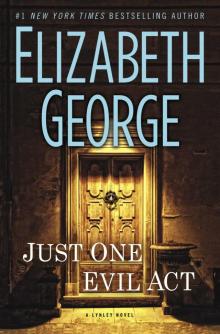 Just One Evil Act
Just One Evil Act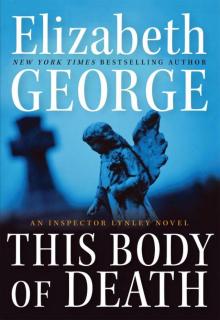 This Body of Death
This Body of Death The Edge of the Water
The Edge of the Water For the Sake of Elena
For the Sake of Elena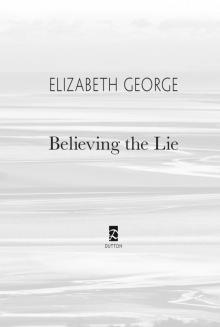 Believing the Lie
Believing the Lie The Edge of the Shadows
The Edge of the Shadows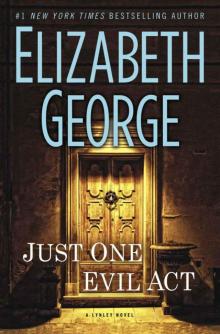 Just One Evil Act: A Lynley Novel
Just One Evil Act: A Lynley Novel In Pursuit of the Proper Sinner
In Pursuit of the Proper Sinner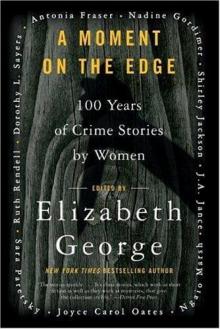 A Moment on the Edge:100 Years of Crime Stories by women
A Moment on the Edge:100 Years of Crime Stories by women Elizabeth I
Elizabeth I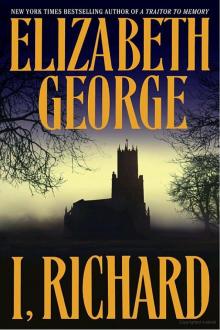 I, Richard
I, Richard A Traitor to Memory
A Traitor to Memory Missing Joseph
Missing Joseph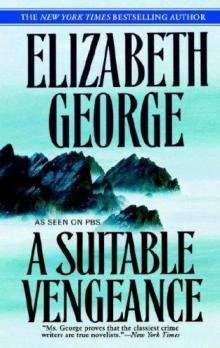 A Suitable Vengeance
A Suitable Vengeance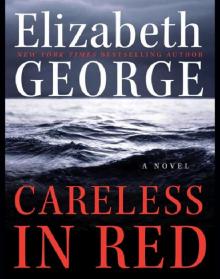 Careless in Red
Careless in Red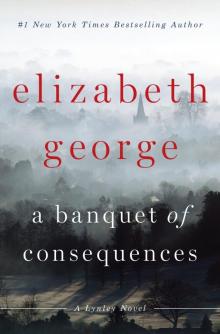 A Banquet of Consequences
A Banquet of Consequences Playing for the Ashes
Playing for the Ashes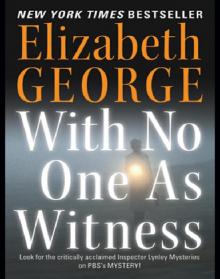 With No One As Witness
With No One As Witness Deception on His Mind
Deception on His Mind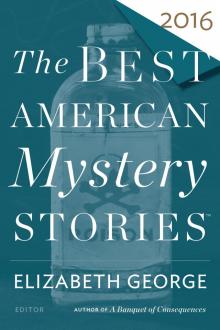 The Best American Mystery Stories 2016
The Best American Mystery Stories 2016 A Great Deliverance
A Great Deliverance In the Presence of the Enemy
In the Presence of the Enemy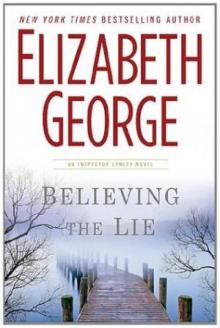 Believing the Lie il-17
Believing the Lie il-17 The Edge of the Light
The Edge of the Light SW01 - The Edge of Nowhere
SW01 - The Edge of Nowhere A Place of Hiding
A Place of Hiding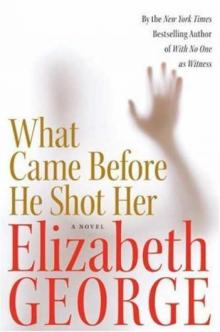 What Came Before He Shot Her il-14
What Came Before He Shot Her il-14 Payment In Blood
Payment In Blood The Punishment She Deserves
The Punishment She Deserves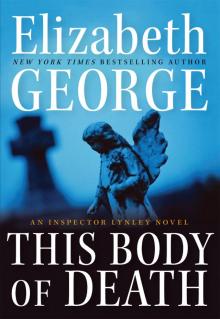 This Body of Death: An Inspector Lynley Novel
This Body of Death: An Inspector Lynley Novel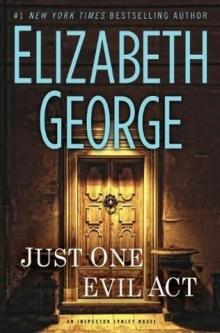 Just One Evil Act il-18
Just One Evil Act il-18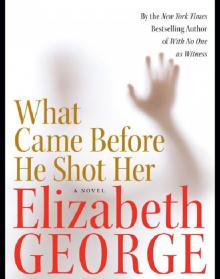 What Came Before He Shot Her
What Came Before He Shot Her Missing Joseph il-6
Missing Joseph il-6